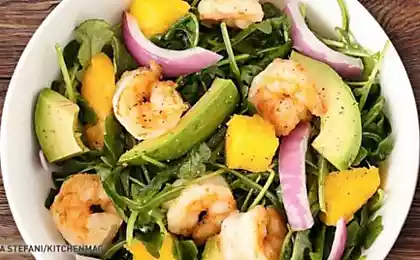657
Taste is a very IMPORTANT sense
They say "taste of life". No form, no smell, no sound and no touch. Why taste?
Maybe it is the strongest feeling? Or the most memorable? Or maybe because cooking involves all of our senses? You grind the cabbage with salt for a salad, knead the dough, put the meat pieces on a baking sheet. You hear shkvorchit preparing the dish in the pan and breathe in his scent. When serving, you decorate it with colorful vegetables and greens to make it pleasing to the eye.
And then eat it. And you delicious.

What makes the dish delicious? For you and for others?
Imagine that after you, in addition to traditional dishes, prepared a new one. Found the recipe online and wanted to surprise everyone.
Although you have added salt strictly according to the recipe, the First guest salt it before to try, and the Second dolivet after the test.
The third is densely sprinkle the dish with pepper, mustard rubs, and even watering from the top with vinegar, and his wife, apologizing, says that he eats.
The fourth guest is chewing mechanically — he is busy talking about politics with a neighbor on the table.
Fifth frowns and pushes away the dish, but gets to eat the usual snacks.
But the Sixth and Seventh nod approvingly and ask for a prescription.
And the Eighth takes Supplement and with tears in his voice said that for the first time in many years he eats the same dish, which prepared him for his dear grandmother, rest her soul, and so, the culinary arts brought him for a moment in the distant cloudless childhood.
The ninth, too, smacked his lips in pleasure, rolls his eyes to the sky and asks for a piece home if you stay.
Tenth child, he's not even trying, and his mom says that he eats only the usual pasta and pizza. Besides, the kid knows that ice cream for dessert, and he looks forward to.
By the way, "you cook like my mother or grandmother" is a serious compliment to the hostess. Even if they were not perfect kulinarnymi, anyway, the food is familiar from childhood, in most cases, seems to us to be the most delicious.
WHY DO WE TASTE
Taste is an evolutionary protective mechanism.
The ability to recognize the taste of salt, according to one theory, inherited from the primates, aquatic vertebrates, and modern man it is necessary not to eat excessive amounts of sodium.
Distrust kids to the new food, it is also a defense mechanism. The kids all taste it, but what is food and what is not, is determined by the cultural environment and parents. It is assumed that preferences in food are laid in the womb: what the mother eats, you'll love the kid – the food will look familiar. Taste is exacerbated in women during pregnancy to the expectant mother quickly identified possible venom.

SIX TASTES
Human language, on average, about 10,000 taste buds. Each receptor consists of mini-receptors, the number from 50 to 150. They react, as previously supposed, in four flavors: sour, sweet, salty horiki, but was later discovered two more: the fat and umami.
Umami, or "savory" gives one of the amino acids – glutamine. It gives a special flavour of aged cheeses, hams and smoked and pasta anchovy: in the process of aging protein products, enzymes free glutamic acid, and the taste of her felt more intense. The longer the product is aged, the spicier the taste. Glutamic acid is widely used in the food industry in sauces and seasonings.
Salty, sour, sweet and bitter is a simple definition of taste, but product evaluation is given in many respects:
THE NOSE KNOWS
Language responds to the sweetness in the cake, but at the same time, the nose feels the fragrance of vanilla, berries, chocolate and lemon peel.
If you have a runny nose, you probably recognize the four basic tastes, but, most likely, indistinguishable from the orange, grapefruit or pear from the Apple.
EAT WITH YOUR EYES
Kind of food is equally important.
In one experiment, students could not bring myself to eat the offered cake in shape of dog feces, despite the significant aroma of chocolate and vanilla and the knowledge of the composition of the dessert.
White wine is coloured red, is misleading even for experienced tasters. Cheese with sharp corners seems sharper than the identical, but the round shape.
In another experiment, students tried a variety of orange juice, but slightly tinted dark seemed sweeter and a pale sour. Cherry pop red seemed Vishnevoe and white – with exactly the same taste no.

PSYCHOLOGICAL FACTORS
The taste is also influenced by mass psychological factors. For example, the food in the packaging of your favorite company seem better. If someone at the table holding his nose, it affects the taste adversely. If someone eats a dish for both cheeks, and then you can ignite the appetite. Sometimes the dish seems to taste better just because someone strongly recommends or just colorfully lurid.
Interesting experiment "recommendations" were carried out with rats. It is known that rats do not like cocoa. But scientists were able to isolate a single rat and cram in a little cocoa. Then she was released and she returned to a group of rats. As soon as the other rats sensed in her breath the new fragrance, they immediately ran to find its source and discover just pounced on cocoa.
The dish may also seem tastier if you will report that it was prepared by the famous chef. If the product is very expensive. If it is not in your area is exotic. If this product is the deficit. Many admit that they lost interest in many products as soon as they became freely traded in every store.
CULTIVATING TASTE
Some people think healthy food tastes better if they know it has a lot of vitamins, just take the Supplement. But others believe that tasty can only be harmful. They even have to hide the usefulness of a product that they did not perceive it as a medicine, disgust wrinkling his nose.
By the way about the cure. Fresh olive oil slightly bitter and he had a tickle in my throat – this effect has substance "oleocanthal" — natural, anti-inflammatory agent, with the same mechanism of action as the pharmaceutical drug Ibuprofen.
Try already with this knowledge, to dip the bread crust in light green extra virgin olive oil, enjoy the language, its astringency and bitterness, to feel, as a gag – the more scratchy, the more there oleocanthal. Would you this bitterness ambrosia? If you don't show, then try for another two weeks to nine times. At some point, the maximum for the tenth time, you are guaranteed to ask for supplements.
This method is applicable not only to superpolator olive oil. If you think a product is useful for you, but you don't like him, continue to periodically have a little piece of it. Give him a chance and he will definitely win your location. The same is true for children.
Tastes can be educated. We think we are eating what we love, and actually love what I eat. We get used to the product and we want it. And Vice versa – if we haven't eaten any product, then forget about it.
So no need to feel sorry for those who had to give up in the name of beauty and health from cake and ice cream. Rye gray spongy fresh bread with Golden honey – is a real treat. Ordinary grape they think a hundred times sweeter than those who can not imagine life without concentrated sweets.
Also interesting: Simple test: do you really
What to replace the potatoes
From a reader comment:
"So, while we eat chips, cookies, manaseki and so on, our taste buds get used to more intense irritation, the normal and ordinary food seems bland and boring. However, it is only to refrain from "treats" at least a week – and begin to understand that, for example, a sweet pepper – it is really sweet. And not all tomatoes taste the same like plastic. And that fried chicken can, in principle, not to add salt to it so well. And that oatmeal, which added a bit of raisins and cinnamon, did not require butter and sugar. If I now get to try some of the salad "Mimosa" or the finished cake with cream roses – the taste seems to be coarse, vulgar and Intrusive. I don't want it. A very long time is not desirable. Really."published
Author: Eugene Kobylecka
Source: www.facebook.com/foodofhuman/posts/687705474737231:0
Maybe it is the strongest feeling? Or the most memorable? Or maybe because cooking involves all of our senses? You grind the cabbage with salt for a salad, knead the dough, put the meat pieces on a baking sheet. You hear shkvorchit preparing the dish in the pan and breathe in his scent. When serving, you decorate it with colorful vegetables and greens to make it pleasing to the eye.
And then eat it. And you delicious.

What makes the dish delicious? For you and for others?
Imagine that after you, in addition to traditional dishes, prepared a new one. Found the recipe online and wanted to surprise everyone.
Although you have added salt strictly according to the recipe, the First guest salt it before to try, and the Second dolivet after the test.
The third is densely sprinkle the dish with pepper, mustard rubs, and even watering from the top with vinegar, and his wife, apologizing, says that he eats.
The fourth guest is chewing mechanically — he is busy talking about politics with a neighbor on the table.
Fifth frowns and pushes away the dish, but gets to eat the usual snacks.
But the Sixth and Seventh nod approvingly and ask for a prescription.
And the Eighth takes Supplement and with tears in his voice said that for the first time in many years he eats the same dish, which prepared him for his dear grandmother, rest her soul, and so, the culinary arts brought him for a moment in the distant cloudless childhood.
The ninth, too, smacked his lips in pleasure, rolls his eyes to the sky and asks for a piece home if you stay.
Tenth child, he's not even trying, and his mom says that he eats only the usual pasta and pizza. Besides, the kid knows that ice cream for dessert, and he looks forward to.
By the way, "you cook like my mother or grandmother" is a serious compliment to the hostess. Even if they were not perfect kulinarnymi, anyway, the food is familiar from childhood, in most cases, seems to us to be the most delicious.
WHY DO WE TASTE
Taste is an evolutionary protective mechanism.
- The bitterness of the plant could warn about the content of the poison,
- sweetness and fat to identify light calories
- the sour taste helped to determine the ripeness of fruit.
The ability to recognize the taste of salt, according to one theory, inherited from the primates, aquatic vertebrates, and modern man it is necessary not to eat excessive amounts of sodium.
Distrust kids to the new food, it is also a defense mechanism. The kids all taste it, but what is food and what is not, is determined by the cultural environment and parents. It is assumed that preferences in food are laid in the womb: what the mother eats, you'll love the kid – the food will look familiar. Taste is exacerbated in women during pregnancy to the expectant mother quickly identified possible venom.

SIX TASTES
Human language, on average, about 10,000 taste buds. Each receptor consists of mini-receptors, the number from 50 to 150. They react, as previously supposed, in four flavors: sour, sweet, salty horiki, but was later discovered two more: the fat and umami.
Umami, or "savory" gives one of the amino acids – glutamine. It gives a special flavour of aged cheeses, hams and smoked and pasta anchovy: in the process of aging protein products, enzymes free glutamic acid, and the taste of her felt more intense. The longer the product is aged, the spicier the taste. Glutamic acid is widely used in the food industry in sauces and seasonings.
Salty, sour, sweet and bitter is a simple definition of taste, but product evaluation is given in many respects:
- aroma
- temperature,
- consistency,
- the type and form of submission.
THE NOSE KNOWS
Language responds to the sweetness in the cake, but at the same time, the nose feels the fragrance of vanilla, berries, chocolate and lemon peel.
If you have a runny nose, you probably recognize the four basic tastes, but, most likely, indistinguishable from the orange, grapefruit or pear from the Apple.
EAT WITH YOUR EYES
Kind of food is equally important.
In one experiment, students could not bring myself to eat the offered cake in shape of dog feces, despite the significant aroma of chocolate and vanilla and the knowledge of the composition of the dessert.
White wine is coloured red, is misleading even for experienced tasters. Cheese with sharp corners seems sharper than the identical, but the round shape.
In another experiment, students tried a variety of orange juice, but slightly tinted dark seemed sweeter and a pale sour. Cherry pop red seemed Vishnevoe and white – with exactly the same taste no.

PSYCHOLOGICAL FACTORS
The taste is also influenced by mass psychological factors. For example, the food in the packaging of your favorite company seem better. If someone at the table holding his nose, it affects the taste adversely. If someone eats a dish for both cheeks, and then you can ignite the appetite. Sometimes the dish seems to taste better just because someone strongly recommends or just colorfully lurid.
Interesting experiment "recommendations" were carried out with rats. It is known that rats do not like cocoa. But scientists were able to isolate a single rat and cram in a little cocoa. Then she was released and she returned to a group of rats. As soon as the other rats sensed in her breath the new fragrance, they immediately ran to find its source and discover just pounced on cocoa.
The dish may also seem tastier if you will report that it was prepared by the famous chef. If the product is very expensive. If it is not in your area is exotic. If this product is the deficit. Many admit that they lost interest in many products as soon as they became freely traded in every store.
CULTIVATING TASTE
Some people think healthy food tastes better if they know it has a lot of vitamins, just take the Supplement. But others believe that tasty can only be harmful. They even have to hide the usefulness of a product that they did not perceive it as a medicine, disgust wrinkling his nose.
By the way about the cure. Fresh olive oil slightly bitter and he had a tickle in my throat – this effect has substance "oleocanthal" — natural, anti-inflammatory agent, with the same mechanism of action as the pharmaceutical drug Ibuprofen.
Try already with this knowledge, to dip the bread crust in light green extra virgin olive oil, enjoy the language, its astringency and bitterness, to feel, as a gag – the more scratchy, the more there oleocanthal. Would you this bitterness ambrosia? If you don't show, then try for another two weeks to nine times. At some point, the maximum for the tenth time, you are guaranteed to ask for supplements.
This method is applicable not only to superpolator olive oil. If you think a product is useful for you, but you don't like him, continue to periodically have a little piece of it. Give him a chance and he will definitely win your location. The same is true for children.
Tastes can be educated. We think we are eating what we love, and actually love what I eat. We get used to the product and we want it. And Vice versa – if we haven't eaten any product, then forget about it.
So no need to feel sorry for those who had to give up in the name of beauty and health from cake and ice cream. Rye gray spongy fresh bread with Golden honey – is a real treat. Ordinary grape they think a hundred times sweeter than those who can not imagine life without concentrated sweets.
Also interesting: Simple test: do you really
What to replace the potatoes
From a reader comment:
"So, while we eat chips, cookies, manaseki and so on, our taste buds get used to more intense irritation, the normal and ordinary food seems bland and boring. However, it is only to refrain from "treats" at least a week – and begin to understand that, for example, a sweet pepper – it is really sweet. And not all tomatoes taste the same like plastic. And that fried chicken can, in principle, not to add salt to it so well. And that oatmeal, which added a bit of raisins and cinnamon, did not require butter and sugar. If I now get to try some of the salad "Mimosa" or the finished cake with cream roses – the taste seems to be coarse, vulgar and Intrusive. I don't want it. A very long time is not desirable. Really."published
Author: Eugene Kobylecka
Source: www.facebook.com/foodofhuman/posts/687705474737231:0
























